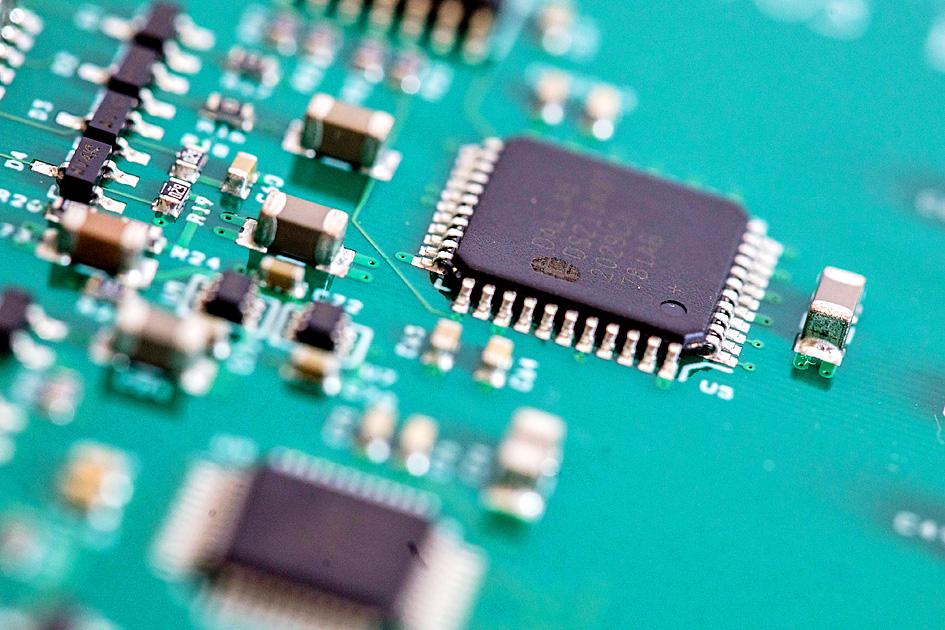Taiwan Semiconductor Manufacturing Co (TSMC, 台積電) remained the world’s third-largest IC supplier in the first quarter of this year, while MediaTek Inc (聯發科) was the industry’s 10th-largest firm, moving up six spots from the previous quarter, advisory firm IC Insights said on Tuesday.
Contract chipmaker TSMC posted sales of US$12.91 billion, up 25 percent from a year earlier, IC Insights said in a report.
TSMC benefited from strong global demand for emerging technologies such as 5G applications, and high-performance computing and Internet of Things devices, the report said.

Photo: Bloomberg
Sales at MediaTek, Taiwan’s largest IC designer, grew 90 percent year-on-year to US$3.85 billion, it said.
On the back of strong shipments of 5G chips, MediaTek overtook six of its rivals, including Infineon Technologies AG of Germany, which posted US$3.25 billion in sales, and STMicroelectronics NV of Switzerland, which posted US$3.01 billion in sales, the report said.
MediaTek’s growth in the first quarter was the second-largest among companies in the ranking, behind Advanced Micro Devices Inc (AMD) of the US, which advanced from 18th to 11th place on the back of a 93 percent sales increase to US$3.45 billion.
MediaTek and AMD replaced China’s HiSilicon Technologies Inc (海思半導體) and Japan’s Sony Corp in the top 15.
HiSilicon, which ranked 12th in last year’s ranking, is the semiconductor design division of telecommunications giant Huawei Technologies Co (華為), which accounts for more than 90 percent of its sales.
Since the fourth quarter of last year, US sanctions impeded HiSilicon from purchasing ICs from its main supplier, TSMC, the report said.
The worldwide largest IC firm was Intel Corp of the US, defending its top spot despite a year-on-year decline in sales of 4 percent to US$18.68 billion, it said.
South Korea’s Samsung Electronics Co remained in second place, posting sales of US$17.07 billion, up 15 percent from a year earlier, it said.
TSMC was trailed by South Korean DRAM chipmaker SK Hynix Inc in fourth place, posting sales of US$7.63 billion, the report said.
US firms ranked fifth to ninth: Micron Technology Co with US$6.58 billion in sales, Qualcomm Inc with US$6.28 billion, Broadcom Inc with US$4.84 billion, Nvidia Corp with US$4.63 billion and Texas Instruments Inc with US$4.03 billion, the report said.
Apple Inc ranked 13th with its chip division posting sales of US$3.08 billion, it said.
Japan’s Kioxia Corp claimed the last spot on the list with sales of US$2.59 billion, the report said.
The top 15 IC firms posted a combined US$101.86 billion in sales, up 21 percent from a year earlier, IC Insights said.

SELL-OFF: Investors expect tariff-driven volatility as the local boarse reopens today, while analysts say government support and solid fundamentals would steady sentiment Local investors are bracing for a sharp market downturn today as the nation’s financial markets resume trading following a two-day closure for national holidays before the weekend, with sentiment rattled by US President Donald Trump’s sweeping tariff announcement. Trump’s unveiling of new “reciprocal tariffs” on Wednesday triggered a sell-off in global markets, with the FTSE Taiwan Index Futures — a benchmark for Taiwanese equities traded in Singapore — tumbling 9.2 percent over the past two sessions. Meanwhile, the American depositary receipts (ADRs) of Taiwan Semiconductor Manufacturing Co (TSMC, 台積電), the most heavily weighted stock on the TAIEX, plunged 13.8 percent in

A wave of stop-loss selling and panic selling hit Taiwan's stock market at its opening today, with the weighted index plunging 2,086 points — a drop of more than 9.7 percent — marking the largest intraday point and percentage loss on record. The index bottomed out at 19,212.02, while futures were locked limit-down, with more than 1,000 stocks hitting their daily drop limit. Three heavyweight stocks — Taiwan Semiconductor Manufacturing Co (TSMC, 台積電), Hon Hai Precision Industry Co (Foxconn, 鴻海精密) and MediaTek (聯發科) — hit their limit-down prices as soon as the market opened, falling to NT$848 (US$25.54), NT$138.5 and NT$1,295 respectively. TSMC's

In a small town in Paraguay, a showdown is brewing between traditional producers of yerba mate, a bitter herbal tea popular across South America, and miners of a shinier treasure: gold. A rush for the precious metal is pitting mate growers and indigenous groups against the expanding operations of small-scale miners who, until recently, were their neighbors, not nemeses. “They [the miners] have destroyed everything... The canals, springs, swamps,” said Vidal Britez, president of the Yerba Mate Producers’ Association of the town of Paso Yobai, about 210km east of capital Asuncion. “You can see the pollution from the dead fish.

TARIFFS: The global ‘panic atmosphere remains strong,’ and foreign investors have continued to sell their holdings since the start of the year, the Ministry of Finance said The government yesterday authorized the activation of its NT$500 billion (US$15.15 billion) National Stabilization Fund (NSF) to prop up the local stock market after two days of sharp falls in reaction to US President Donald Trump’s new import tariffs. The Ministry of Finance said in a statement after the market close that the steering committee of the fund had been given the go-ahead to intervene in the market to bolster Taiwanese shares in a time of crisis. The fund has been authorized to use its assets “to carry out market stabilization tasks as appropriate to maintain the stability of Taiwan’s